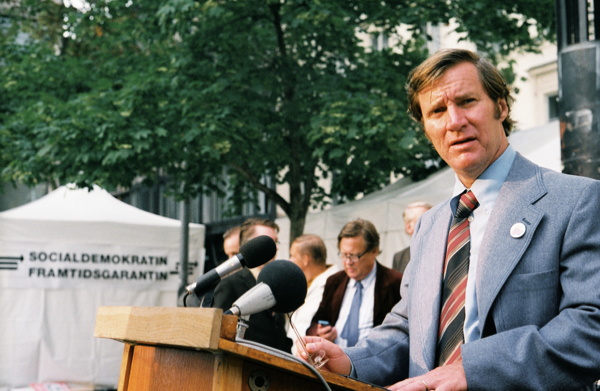
Call Girl
Directed by Mikael Marcimain
Written by Mikael Marcimain
Sweden / Norway, 2012
In 2012, a controversy swept through Sweden based upon a film titled Call Girl. The film was based upon a real-life scandal in the 1970s, when a madam named Doris Hope was convicted of running a prostitution ring that serviced clients in the highest levels of government. The film asserted that Hope committed much worse crimes as well, with the assistance of many of the officials who employed her. Call Girl has finally arrived in the United States as a part of the Film Comment Selects film festival, and it’s not hard to see where the controversy came from. The film is well-made, but does little to earn its “inspired by a true story” title card.
Iris Dahl (Sofia Karemyr) is a 14-year-old girl who lands in a group home after her mother can’t keep her under control. Left on her own with insufficient supervision, she becomes mixed up with Dagmar Glans (Pernilla August, playing a stand-in for Hope). The prostitution of underage girls to government officials was the issue which caused the most scandal in Sweden, but as the police close in on Glans a number of other crimes occur as well.

Stylistically, Call Girl deserves accolades for refusing to take an objectifying stance with its obviously racy material. Karemyr is an attractive woman, and obviously much older than 14, but the camera does not linger on her nudity or make her love scenes any longer than they need be for the purpose of a given scene. In fact this film holds back so fervently that it almost becomes prudish: inserted lines of dialogue from politicians and media talking heads seem to be scolding Sweden itself for opinions about sex that the movie sees as tantamount to abuse.
Call Girl‘s biggest issue is that it’s a schizophrenic sort of picture, constantly struggling to decide what kind of movie it is going to be. Iris’ story is a damaged girl’s coming-of-age tale, but the police who are tracking Glans seem to be living in a standard procedural. The cops’ investigation moves at too fast a pace to accompany Iris’ discovery of what her life is becoming, and Iris’ languid awakening doesn’t fit well into a police investigation.
Which is not to say that the film is poorly made. Both halves of the story are expertly shot and well-paced within themselves. All of the female roles are perfectly acted; August in particular is the very personification of evil, a stark departure from the role most American audiences know her for, Anakin Skywalker’s mother in Star Wars Episode I. It’s just that the two halves of the story don’t add up to a well-paced film until the final reel, when Call Girl finally comes together into a decent thriller.

Also like many mental patients, Call Girl has a tenuous claim to reality. Every true-to-life film plays a little loose with the facts – just watch the climax of Argo for proof – and that’s fine. Even the most dramatic real-world stories don’t make for good movies without those adjustments. But Call Girl accuses people who were in the public eye, people in positions of power whose names could easily be learned via Google or a trip to any Swedish library, of crimes which have no statute of limitations.
Call Girl is very conspicuous in the fact that none of its most serious allegations can be proven. Its climax turns upon pieces of evidence that are, conveniently, classified and/or destroyed. Curiously, it never names any of its public figures or the exact year when it takes place – during an opening TV clip the host welcomes “our Prime Minister” without using his name, in a way that real TV hosts would never do. Iris Dahl herself is a character whose existence (or the existence of a real-life counterpart with a different name) can never be confirmed.
All the audience is left with is Glans, who is an easy target; Hope’s conviction for prostitution is a matter of public record. This is in keeping with the mildly prudish worldview mentioned above, which is dependent upon having one person to blame after debate on all social issues has been exhausted. Call Girl is a film designed to stir people up and get them outraged, and that’s exactly what happened in Sweden for most of 2012. But it is not an agent for social change, not until it cures its odd case of multiple-personality disorder.
-Mark Young

